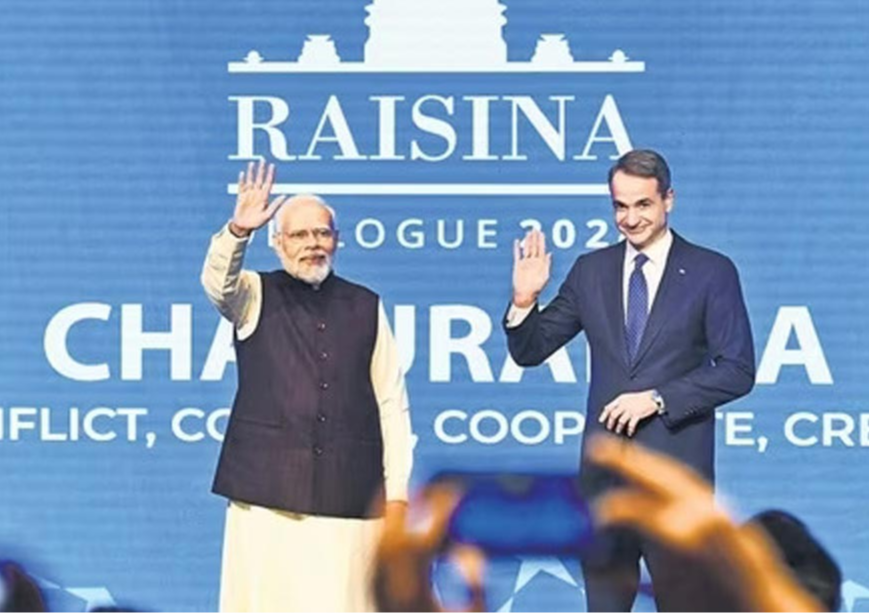For the third consecutive year in a row, as a testament to Europe’s increasing importance in India’s strategic vision, the Raisina Dialogue hosted a European leader as chief guest. The speech of the Prime Minister (PM) of Greece, Kyriakos Mitsotakis, inaugurating the ninth edition of the Raisina Dialogue on February 21, reciprocated this vision by reiterating that “strengthening the partnership with India should be a cornerstone of Europe’s foreign policy”. PM Narendra Modi’s visit to Greece last year, the first by an Indian PM in 40 years, upgraded Indo-Greek ties to the level of a strategic partnership. Mitsotakis’s visit to India, the first by a Greek PM since 2008, served to continue this upward momentum.
Security cooperation dates back to when, despite Western sanctions after India’s nuclear tests in 1998, Greece and India signed an MoU on defence cooperation. For both countries, military modernisation is an important goal and defence expenditures have risen. These ambitions have laid the foundation to explore the co-development of military hardware under the Make in India programme. The two countries find themselves aligning on wider regional issues such as the security axis between Pakistan, Turkey and Azerbaijan, which has led to a strengthening of India’s ties with both Greece and Armenia. Athens has consistently supported New Delhi’s stance on Kashmir and its bid for a UNSC permanent seat, while India has supported Greece’s position on northern Cyprus and its disputes with Turkey in the Aegean Sea. Furthermore, the two countries are engaging in joint naval exercises in the Mediterranean Sea to enhance maritime security.
Security cooperation dates back to when, despite Western sanctions after India’s nuclear tests in 1998, Greece and India signed an MoU on defence cooperation.
Both countries are maritime nations and see eye to eye when it comes to maintaining an open rules-based order in the Indo-Pacific as well as the Mediterranean with its abundant oil reserves and location at the crossroads of Asia, Europe and Africa. Shared commitments to ensuring freedom of navigation and respect for the UN Convention on the Law of the Sea (UNCLOS) have brought India and Greece closer. In this context, Greece has just joined India’s Indo-Pacific Oceans initiative launched in 2019. Greece’s strategic location in the eastern Mediterranean allows it to be conceived as a potential gateway for Indian businesses into the EU through the port of Piraeus, the region’s primary hub connecting Asia and Europe. Yet India and Greece need to circumvent the caveat of Chinese state-owned firm COSCO having a 60% stake in this port, touted as the dragon’s head of China’s Belt and Road Initiative (BRI) in Europe. Amidst EU-India Free Trade Agreement negotiations, Greece’s sophisticated port infrastructure and the country’s massive shipping industry can help facilitate EU-India trade.
Greece is an integral part of the ambitious India-Middle East-Europe Economic Corridor (IMEC) project, which has been derailed due to the ongoing Israel-Hamas war. Referring to the IMEC as a peace project and India’s natural doorstep to Europe and beyond, Mitsotakis urged participating nations to persevere with the project. This is in sync with a framework agreement signed between India and the UAE that indicates ongoing interest to operationalise the project despite tough geopolitical conditions. Indeed, the turbulence in the Red Sea has only strengthened the rationale for alternate shipping and trading routes.
India views Greece as a significant naval power in the eastern Mediterranean, where the Chinese presence is expanding. Simultaneously, Greek perceptions of China have shifted since the pandemic, and Chinese companies have been omitted from public tenders. Greece, previously counted amongst China’s closest partners in Europe, is now balancing its ties with China and the US while emphasising its EU and NATO orientation given its tense relations with Turkey. Under Mitsotakis’s Greece 2.0 plan for economic revival, the Greek economy has taken its place among the eurozone’s fastest-growing and is no longer the black sheep of Europe. Aiming to double Indo-Greek bilateral trade – valued at $2 billion in 2022-23 — by 2030, Mitsotakis travelled with a 150-member business delegation to India and also visited the business hubs of Mumbai and Bangalore. Already host to 20,000 Indians, another key item on the Indo-Greek agenda is a pact on mobility and migration to facilitate further skilled and legal Indian migration into the country.
Moving beyond the cliché of being the world’s oldest and largest democracies, the two countries are rapidly converting their many convergences into practical engagements. For India and Greece, this is a win-win partnership.
This commentary originally appeared in Hindustan Times.
The views expressed above belong to the author(s). ORF research and analyses now available on Telegram! Click here to access our curated content — blogs, longforms and interviews.




 PREV
PREV



